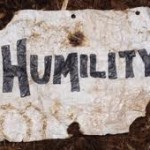 “Pride makes us artificial and humility makes us real.”
“Pride makes us artificial and humility makes us real.”
Thomas Merton
Thomas Merton, in his book, The Wisdom of the Desert, recounts a story of the early desert fathers. These were men who gave up everything to live a very simple monastic lifestyle focused on setting aside all elements of self in order to focus on building relationships of service toward others. However, even these pious, selfless men struggled with the battle between pride and humility.
Merton shares an example in which a certain brother was consistently praised by his contemporaries in the presence of Abbot Anthony, the leader of the community. One day, the elder abbot tested this particular brother and found that he could not bear to be insulted. Upon discovering this dangerous flaw, Abbot Anthony gently confronted him, stating “you brother are like a house with a big strong gate, that is freely entered in by robbers through all the windows.”
As the above story reminds us, one of the greatest challenges with pride is that its onset is often insidious. It grows in us little by little until one day we find ourselves swollen from an inflated view of self. This is when pride turns destructive, both for ourselves and as those around us.
Pride has perplexed philosophers and theologians for centuries, and is an especially paradoxical emotion in American culture. On the one hand, we applaud rugged individualism, self-reliance and personal excellence. On the other, we understand that too much pride can easily tip the balance toward vanity, selfishness and ultimately, self-destruction.
Pride, however, does not simply hurt us personally. If left unchecked, it corrodes human community and erodes our sense of dependence on one another. In effect, it lulls us into believing we are more talented, capable or successful than we really are. So what can we do to keep our pride in check? Try these three simple practices:
1. Ask for feedback. Going through life without asking for feedback is like driving in a foreign country without ever stopping to ask directions. One of the best ways to help keep your ego in check is to ask those you know for their candid and constructive feedback. Ask them if the way you see yourself is accurate with how others perceive you. Ask them if you’re words and your ways, your tone and your temperament, carry tinges of arrogance or hints of haughtiness. Be open and genuinely interested in their feedback and maintain an open-door policy with those who work with you to share their thoughts without any fear of reprisal.
2. Understand your responsibility. One of the biggest mistakes I see leaders routinely make is they forget their responsibility is to guide others in achieving mutually beneficial goals and objectives, not to indiscriminately wield power over others. If you are operating effectively as a leader, you likely have figured out your value-added is often invisible. It is what those around you achieve that truly validates your leadership, not what you do to promote yourself. Keep pride at bay by focusing on enabling others to succeed and trust that your efforts are making a positive difference.
3. Be Your Best You. Psychologists tell us one of the primary reasons pride is such a powerful influence in our lives is our need to be seen as a person of innate worth and value. As leaders, however, this can quickly lead us into a trap of allowing our transient perceptions to determine our self-confidence. Don’t fall into that trap! If you do, I promise you will be on a constant roller coaster ride of emotional highs and lows that will leave you exhausted and those around confused, dazed and off-balance. Remember, the true measure of success is giving the best of yourself to the effort at hand—no one expects more and you shouldn’t either. So don’t let your ego get the best of you. Strive to be your best and do your best and let the results of your efforts speak for themselves.
But no matter how successful you become, never forget that pride can destroy you. You must stand guard against the danger of believing you alone are responsible for your success. For as the example of the prideful monastic brother reminds us, the stronger the gate, the bigger the windows.
